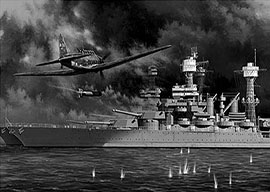
December 06, 2010

Franklin D. Roosevelt
What was his motivation? To understand, one must become acquainted with Franklin Roosevelt’s unbalanced mind”not an easy assignment. Pearl Harbor was the culmination of Roosevelt’s meddling, internationalist foreign policy going back several years. Roosevelt persevered in a determined policy that would inevitably lead to all-out war in both Asia and Europe. It was no accident. It was by design. In his reelection campaign for an unprecedented third term in 1940, Roosevelt said:
While I am talking to you mothers and fathers, I give you one more assurance. I have said this before, but I shall say it again and again and again. Your boys are not going to be sent into any foreign wars.
New York Congressman Hamilton Fish III called that statement “the most shocking, contemptible and untruthful public utterance of any president in our history.”
I have recently discovered Fish’s provocative and illuminating FDR, The Other Side of the Coin: How We Were Tricked Into World War II (1976). Written when Fish was 86, it amounts to one grand excoriation of Roosevelt, with Pearl Harbor the centerpiece. Fish writes:
I made the first speech advocating war with Japan on December 8, 1941. This speech was heard by over 20 million Americans and it upheld President Roosevelt’s theme of the ‘Day of Infamy’. I now publicly disavow that speech as a result of subsequent historical evidence.
Further:
The Honorable Clare Boothe Luce was right when she said that President lied us into war by the back door in order to get into war with Germany. Sir Oliver Lyttleton, British Minister of Productions in Churchill’s cabinet, speaking before the American Chamber of Commerce in London in 1944, let the cat out of the bag: ‘Japan was provoked into attacking the Americans at Pearl Harbor…. It is a travesty on history to ever say America was forced into the war.’
The Other Side of the Coin is a goldmine of facts and insights, written by someone who was there and knew Roosevelt firsthand. Fish’s visit to Europe in August 1939, including his meeting with German foreign minister Joachim von Ribbentrop in Salzburg, is set forth in spellbinding detail. A few weeks later, Fish was in London on the floor of Parliament when Prime Minister Neville Chamberlain declared war on Germany. Ambassador Joe Kennedy had provided Fish a reserved seat. Later in the day, Kennedy telephoned Roosevelt and told him, “It’s all over. The party is on. It’s the end of the world. The end of everything.”
My own view is that the road to Pearl Harbor began at Danzig in the summer of 1939, if not before. It was Roosevelt’s repeated intrigues”chiefly working through the American ambassador to France, William Bullitt, who gave secret assurances to England and France that Washington would come to their aid in any conflict with Germany”that caused the outbreak of war in Europe.
 When war came, Roosevelt was stymied and incapable of making good on his promises. Why? Simple. Americans were overwhelmingly against active involvement in a European war and so was the U.S. Congress, which was the only entity that could declare war under the Constitution. But contradicting all his public pronouncements, Roosevelt tried very hard to get into a shooting match with Hitler in the North Atlantic. Hitler declined the invitation. He had his hands full with the Soviet Union in the East.
When war came, Roosevelt was stymied and incapable of making good on his promises. Why? Simple. Americans were overwhelmingly against active involvement in a European war and so was the U.S. Congress, which was the only entity that could declare war under the Constitution. But contradicting all his public pronouncements, Roosevelt tried very hard to get into a shooting match with Hitler in the North Atlantic. Hitler declined the invitation. He had his hands full with the Soviet Union in the East.
I summarized Roosevelt’s endgame in my book:
To escape the humdrum prospect of sitting out the war”the very war he and his foreign policy team had worked so diligently to instigate“Roosevelt gave up on Hitler and instead focused upon Japan, Germany’s ally in the Far East under the Tripartite Pact with Italy….
Starting a war with Japan was a final desperation move. Only by deliberately cornering Japan and getting it to attack first could Roosevelt galvanize his home front, silence “the isolationists,” and rescue the British Empire and Soviet Union. England under Churchill was a non-factor on its own. As for Stalin, the Nazis were by then in Moscow’s suburbs. Time was of the essence.
It was at this moment that Japan bombed Pearl Harbor.